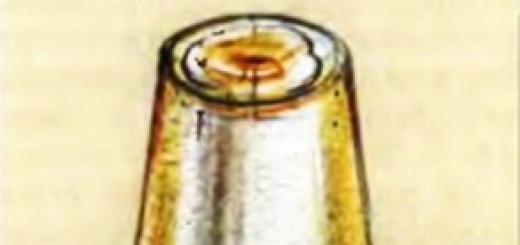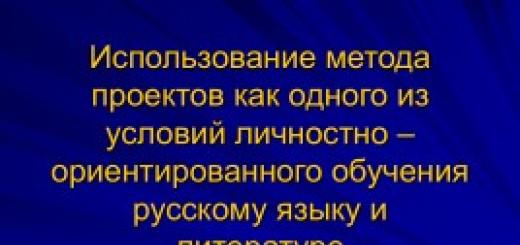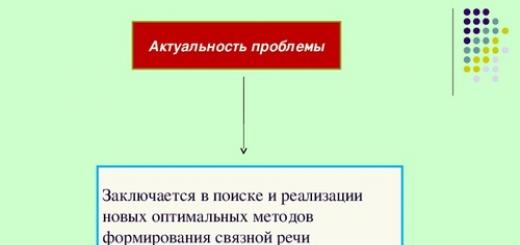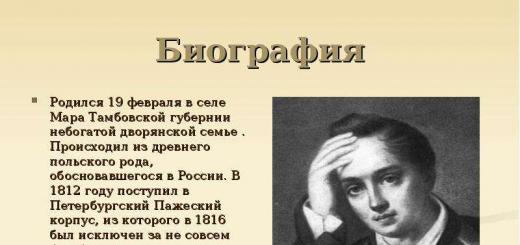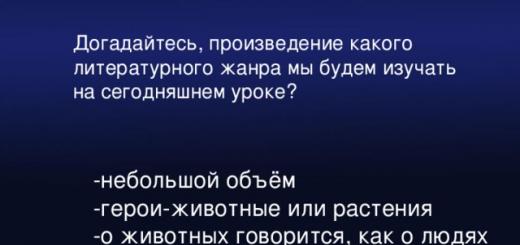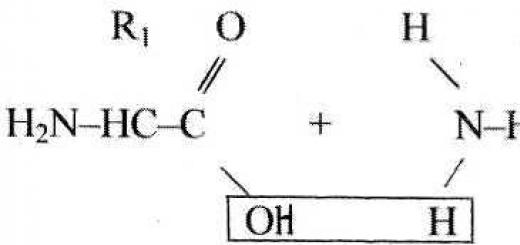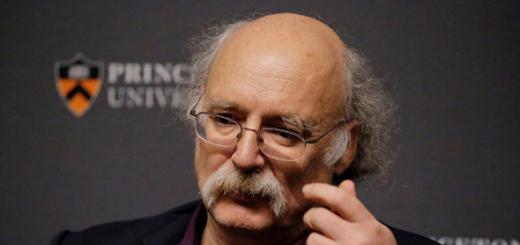Gorodetsky Sergey Mitrofanovich(January 5 (17), 1884, St. Petersburg - June 7, 1967, Obninsk) - Russian poet, prose writer, playwright, critic, publicist, artist.
The son of the writer-ethnographer M.I. Gorodetsky, Sergei Gorodetsky was born into a family with strong cultural traditions and democratic foundations. My father served in the zemstvo department of the Ministry of Internal Affairs, but was also known as a writer, the author of articles on the history of archeology, ethnography, and folklore. Gorodetsky showed early aptitude for drawing and poetry. After graduating from the 6th St. Petersburg Gymnasium, in 1902 he entered the Faculty of History and Philology of St. Petersburg University (did not graduate), where he met and became close with A.A. Block. From that time on, Gorodetsky became interested in poetry.
The imagery and stylistics of Sergei Gorodetsky’s first poetic experiments were determined, on the one hand, by influences coming from the poetry of the younger symbolists - Blok, Andrey Bely, on the other hand, the impressions he took from a trip to the Pskov province, where the young poet participated in peasant games, wrote down songs and beliefs, getting used to the spirit of folk myth-making. Gorodetsky’s poems, imbued with a pantheistic feeling of the completeness and unity of the surrounding world, were enthusiastically received in the “tower” of Vyach. Ivanov, which he visited in 1905, and made him “famous overnight.” Sergei Gorodetsky himself recalled it this way: “...at the end of 1905, after reading my “Yaril” poems in the presence of the entire symbolic Olympus, that is, Vyacheslav Ivanov, Balmont, Bryusova, Sologub, Blok, Bely, Merezhkovsky, Gippius, Berdyaev, professors Zelinsky and Rostovtsev, became a “famous” poet and for a short time the highlight of the “environment.”
In 1906-1907 he published books of poems “Yar”, “Perun”, “Wild Will” - these were symbolist works with a folklore slant. V. Ya. Bryusov, Vyach responded to the collection “Yar”. Ivanov, A. Blok. I was attracted by the feelings of freshness and cheerfulness that wafted from the pages of the young poet’s book, and his ability to express in words the experiences of a soul close to the natural elements.
The thirst for “great, healthy poetry” and the “search for world harmony”, which inspired Gorodetsky from an early age and threw him from one extreme to another (from “mystical anarchism” to “realistic symbolism” and acmeism), lead him to a uniquely interpreted “Russian idea” ”, to the search for a unifying principle in the Christian religion and its bearers - the poor, the crippled (“Rus”, 1910). However, Gorodetsky’s “religious quest” did not meet with support from his inner circle, and Vyach’s merciless sentence. Ivanov, who contributed to the collection “Rus,” put an end to the relationship between Gorodetsky and the leader of the St. Petersburg symbolists.
In 1911 Gorodetsky became one of the organizers of the “Workshop of Poets”. On October 20, 1911, an organizational meeting of the “Workshop of Poets” took place at Gorodetsky’s apartment, at which he, together with N.S. Gumilyov was elected "syndic" of the "Workshop". Thus began a new stage of his literary activity - the Acmeistic one. Gorodetsky becomes one of the ideological inspirers of the new poetic school. Speaking as a critic, he energetically supports his fellow members of the “Workshop of Poets” (A.A. Akhmatova, O.E. Mandelstam and others) and himself receives support from the “master” - Gumilyov.
The collection “Blooming Staff”, published in 1914, combining poems from 1912, was presented by the author as programmatic and Acmeist. This was emphasized both in the “Dedication” that preceded the collection, and in the thoughtful architectonics of the collection, built as a kind of diary, and in the choice of the poetic form - eight lines, which, according to Gumilyov, give “the opportunity to capture the most fleeting thoughts and sensations.” “Active admiration of the world” in its “beautiful complexity” and at the same time the clarity and precision of poetic thought - this is the goal that the poet set for himself on the paths of acmeistic improvement.
At the beginning of the First World War, Sergei Gorodetsky hastened to respond to official patriotism with a collection of poems, “The Fourteenth Year” (1915), which led him to “a quarrel with advanced Russian literature.” In 1915, after the actual collapse of the first “Workshop of Poets,” Gorodetsky actively popularized the work of “new peasant poets” (N.A. Klyuev, S.A. Klychkov, S.A. Yesenin, B.A. Verkhoustiisky, A. Shiryaevets), on his initiative the groups “Krasa” and “Strada” were created, uniting peasant poets.
In 1916, Gorodetsky left Petrograd for the Caucasian Front as a correspondent for the newspaper Russkoye Slovo. There the October Revolution found him. In the first post-revolutionary years, working in Tiflis and Baku, Sergei Gorodetsky became a prominent figure in the literary life of Transcaucasia. Gorodetsky enters service in ROSTA, then in the Political Directorate of the Caspian Fleet. In 1919, in Tiflis, he tried to create an association of young poets, similar to the Acmeist “Workshop of Poets.” In the collection under the characteristic title “Acme”, published by the Tiflis “Workshop of Poets”, Gorodetsky presented several poems in a new stylistic manner (two “Nocturnes”, “Immortality”, “Skulls”). In them, the poet develops the previous Acmeist thesis of accepting the world “in the totality of its beauties and ugliness,” joining with that wing of Acmeism that was represented by the names of V.I. Narbut and M.A. Zenkevich.
From 1921 he lived in Moscow, published widely, and translated poetry of the peoples of the USSR. Until 1924 he worked at the Theater of the Revolution, then until 1932 - in the literary department of the newspaper Izvestia. In Moscow, Sergei Gorodetsky did not abandon attempts to revive the “new” Acmeism. In 1925, the collection “Joint”, prepared by him, was published - the organ of the Moscow “Workshop of Poets”. The search for a poetic language equivalent to the experiences of the revolution brought together in the collection such different poets as P. G. Antokolsky and M. A. Zenkevich, V. M. Inber and I. L. Selvinsky, G. A. Shengeli and A.V. Shiryaevets. In the 1920s, Gorodetsky published collections of his poems “Sickle” (1921), “Mirol” (1923), “From Darkness to Light” (1926), “Edge” (1929).
In the 1930s I worked a lot on opera librettos - it was a good and relatively safe way to make literary money. He wrote a new text (“non-monarchical”) for M. Glinka’s opera “A Life for the Tsar,” called “Ivan Susanin.” During World War II, he was evacuated to Uzbekistan and Tajikistan, translating local poets.
In 1958 he published an autobiographical essay “My Path”. In the 1960s, he wrote poems dedicated to the feats of astronauts. In the last years of his life he taught at the Literary Institute. M. Gorky, working with correspondence students. The last poems are “Hot time”, “The road is visible”.
Books
- Yar. - St. Petersburg, 1907 (2nd ed. - 1910).
- Perun. - St. Petersburg, “Ory”, 1907.
- Wild will. - St. Petersburg, “Torches”, 1908.
- And I. Poems for children. 1908
- Cemetery of passions. Stories, vol. 1, 1909
- Rus.- M., ed. Sytina, 1910.
- Willow. - St. Petersburg, “Rose Hip”, 1913.
- Blooming staff - St. Petersburg, 1914.
- The fourteenth year. - Pg., “Lukomorye”, 1915.
- Pushkin. - Py., 1915
- Izbornik. Poems 1905-1917 - M., 1916.
- Scarlet tornado. - Tiflis, 1918, M. 1927
- The fate of Russia. - Tiflis, 1918.
- Angel of Armenia. - Tiflis, 1919.
- Serp.-Pg., Giza, 1921.
- Mirolom.-M., Giza, 1923.
- Spring of the Atheist L., Priboi, 1925.
- Old woman in spirit, M., “Atheist” 1925
- From darkness to light. - L., GIZ, 1926
- About Ivan the Atheist, L., GIZ, 1926
- Moscow stories. - M., 1927
- Gran. - M., 1929.
- Selected lyrical and lyric-epic poems. 1905-1935.- M., 1936.
- Duma. - Tashkent, 1942.
- Song of Friendship. - Minsk, 1947.
- Poems. 1905-1955.- M., 1956.
- Poems. - M., 1964.
- Poems. - M., 1966.
- Poems and Poems, 1974
Sergei Mitrofanovich Gorodetsky is a famous Russian poet, one of the prominent representatives of Acmeism.
This modernist trend in Russian poetry was formed as a reaction to the extremes of symbolism and followed the principles of returning clarity to literature, the rejection of mystical nebula and the acceptance of the earthly world in its real beauty, bright diversity, and visible concreteness.
Sergei Gorodetsky: biography
Sergei Gorodetsky was born in St. Petersburg on January 5, 1884. His family was distinguished by cultural traditions: his mother knew I.S. Turgenev in her youth, his father was engaged in painting, wrote works on folklore and archeology, and from childhood instilled in the child a passionate love of poetry. Little Sergei often met prominent writers and artists in his parent’s office, and N.S. Leskov even gave him the book “Lefty” with a signature. When the boy was 9 years old, his father died, and all the care for the five children fell on the shoulders of his mother, Ekaterina Nikolaevna.
Student times
In 1902, the young man entered the Faculty of History and Philology at St. Petersburg University. There he became friends with A. Blok, whose poetry had a strong influence on the future work of the talented student. It was to him, the absolute measure of aesthetic and moral sensuality, that Sergei entrusted his most intimate thoughts about various phenomena in art and life.

In addition to his passion for poetry, Sergei Mitrofanovich Gorodetsky, whose biography is interesting to the modern generation, studied Slavic languages, Russian literature, art history and drawing. He even spent some time in the Kresty prison for involvement in the literary movement. Having studied at the university until 1912, he never graduated.
Works of Sergei Gorodetsky
In 1904 and 1905, Gorodetsky made summer travels around the Pskov province, which awakened a sincere interest in folk art in the talented poet. Impressed by intricate ritual dances, ancient round dances, and entertaining fairy tales with elements of pagan antiquity, the 22-year-old author published the book “Yar” (1906) - his first and successful brainchild. In it, the poet vividly recreated the semi-real, multi-colored appearance of Ancient Rus' with mythological images, in which objects of modern times were originally intertwined with echoes of authentic antiquity, pagan beliefs and ritual games. These were cheerful, mischievous poems, breathing with the freshness and youth of poetic feeling.

Critics and readers gave only praise to Gorodetsky, who embodied ancient Slavic mythology in forms understandable to modern literature. Trying to continue his bright triumph and return to the once conquered peak of recognition and glory, Sergei began to rush frantically in search of new paths and tried to expand the range of his own creativity. However, the following publications (the collection “Perun” (1907), “Wild Will” (1908), “Rus” (1910), “Willow” (1914)) did not make the impression on the public that the poet expected. One might say that their appearance went virtually unnoticed.
in the poet's work
In the period 1910-1915, the author tried his hand at prose and published such works as “On Earth”, “Tales. Stories", "Old Nests", "Adam", the comedy "Dark Wind", the tragedy "Marit". Domestic literature also owes the emergence of children's folklore to Sergei, who wrote a large number of children's works and collected drawings of young talents.
In 1911, Sergei Mitrofanovich Gorodetsky showed himself as a literary critic, preparing for publication the collected works of Ivan Savvich Nikitin and accompanying it with an introductory article and detailed notes. In 1912, having become disillusioned with symbolism, together with Nikolai Gumilev he formed the “Workshop of Poets”, began making presentations and actively proclaiming Acmeism, which was clearly reflected in the collections “Willow” and “Blossoming Staff” (1913).
Friendship with Yesenin
During the First World War, Sergei Gorodetsky, whose short biography is taught in schools, came under the influence of nationalist sentiments, which is reflected in the collection “The Fourteenth Year” (1915). This response to official patriotism led him to a quarrel with leading Russian writers.

Since 1915, his friendship with Yesenin began, in which the poet Sergei Gorodetsky considered the hope of Russian literature. A blond young man with curly hair came to the apartment of the accomplished poet on Blok’s recommendation; his poems were tied into an ordinary village scarf. From the first lines, Sergei Mitrofanovich understood what joy had come to Russian poetry. Young Yesenin left the house of the hospitable poet with the collection “The Fourteenth Year,” personally signed by Gorodetsky, and letters of recommendation to various publishing houses.
In the spring of 1916, Gorodetsky, disillusioned with his literary work, quarreled with A. Blok (the leader of the St. Petersburg Symbolists) and went to the Caucasian Front as a newspaper correspondent. It was here that he realized the groundlessness of his recent understandings about the war, which he reflected in poems permeated with aching pain (“Angel of Armenia”, 1918).

During the February Revolution of 1917, the poet was in Iran, working in a camp for typhus patients. The October events found him in the Caucasus: first in Tiflis, where he taught a course in aesthetics at the city conservatory, and then in Baku. In 1918, he wrote the poem “Nostalgia,” which confirmed the poet’s approval of revolutionary events.
Arrangement of the new world
In 1920, Gorodetsky was actively involved in arranging a new life, became the head of the propaganda department, headed the literary part of the political department of the Caspian Fleet, began editing various magazines, and gave articles and lectures on various topics.
In 1921, he moved to Moscow, where he got a job at the Izvestia newspaper (literary department) and, together with Nikolai Nikolaevich Aseev (Soviet poet), headed the literary department of the Theater of Revolution. In the 1920s, he constantly revised his literary views and published frequently. From the beginning of the 30s, Gorodetsky began to actively engage in translations, introducing the readership to the poets of neighboring republics. In addition, he created original opera librettos for several operas.
War years
In the first days of the Great Patriotic War, Sergei, while in Leningrad, wrote a poem “In response to the enemy,” which he read on the radio. Gorodetsky often spoke at recruitment centers, rallies and meetings. During the war years, the poet was evacuated to Uzbekistan, and then to Tajikistan. There he was engaged in translations of poems by local authors. Before the end of the war he returned to the capital, where he continued to write fruitfully.

In 1945, Sergei Gorodetsky buried his wife Anna Alekseevna, his faithful friend and comrade-in-arms throughout his life. In 1958, his autobiographical work “My Way” was published. In the last years of his life he was engaged in teaching activities in them. Gorky. One of Gorodetsky’s last poems was the poem “Harp,” in which the poet addressed the soul of his favorite music, which meant so much to him. Sergei Mitrofanovich Gorodetsky died in 1967, at the age of 83.
(1884 - 1967), poet, prose writer, playwright, critic, publicist, artist.
Born on January 5 (17 NS) in St. Petersburg in the family of an official of the Ministry of Internal Affairs, a writer-ethnographer, and an amateur artist. After graduating from high school, Gorodetsky entered the Faculty of History and Philology of St. Petersburg University (1902), where he met student A. Blok, whose friendship continued for many years. He took special interest in Slavic studies, antiquity, Russian literature, art history, philosophy and folklore. Wrote poetry.
The first book of poems, “Yar,” was published in 1906, followed by the second, “Perun,” and then the third, “Wild Will.” They brought the twenty-two-year-old poet widespread recognition.
Having become disillusioned with symbolism (he attended the famous “Wednesdays” of Vyach. Ivanov, the Symbolist theorist), he became one of the organizers of the “Workshop of Poets”, Acmeists, which included N. Gumilyov, A. Akhmatova, O. Mandelstam and others. They published the magazine “Hyperboreas”. In 1913 he published an eight-line book, “The Blooming Staff.” In 1915, a friendship began with S. Yesenin, in whom he saw the hope of Russian literature and supported him in every possible way.
During the February Revolution he was in Persia, finding himself there along with the retreating Russian troops. October 1917 found the poet in the Caucasus: first he lived in Tiflis, then in Baku. In 1918 he wrote the poem “Nostalgia,” which speaks of the decisiveness of the choice made by the poet: he takes the side of the revolution. In 1920, after units of the Red Army entered Baku, Gorodetsky was actively involved in the construction of a new world: he headed the agitation and propaganda department at ROSTA, headed the literary section of the Political Directorate of the Caspian Fleet, edited various magazines, gave lectures and articles on Russian poetry, music, painting and culture of the Caucasian peoples.
In the summer of 1920, the poet was in Petrograd, meeting several times with Blok, who organized an evening of Gorodetsky’s poetry. Writes poetry, gives articles and reviews. Since 1921 Gorodetsky has lived in Moscow. Collections of poems “Sickle” are published, then “Mirol”, the poem “Red Peter”. Until 1924 he worked in the literary department of Izvestia, publishing translations of poems by Yakub Kolas, Yanka Kupala and others. He took part in the literary life of the capital, writing poetry and prose (the stories "Black Shawl" and "Monument of the Uprising", the novel "The Scarlet Tornado", "Moscow stories").
In the 1930s, he “set himself the task of creating an original libretto for Soviet opera”: he composed the libretto of “Breakthrough”, created the libretto of the opera “Amran” (Prometheus) for the Bolshoi Theater, the libretto of “Alexander Nevsky”, “Dumas about Opanas”, wrote new text of the libretto of the opera "Ivan Susanin", revised into the libretto of "Count Nulin", translated the libretto of "Fidelio", then - "Lohengrin", etc.
In 1936, the poet's Izbornik (Selected Lyrical and Lyric-Epic Poems) was published.
During the Patriotic War, he was evacuated, first in Tashkent, then in Tajikistan. Translated poems by Uzbek and Tajik poets.
He returned to Moscow even before the end of the war, wrote a lot: a book of poems "Song of Friendship" (1945), poems "Afterword", "In Memory of A.N. Radishchev" (1947), "The Kremlin" (1958), "Homer" (1962 ), “Wisdom”, “Meditation” (1964), “My Abode” and many others.
In 1958 he published an autobiographical essay "My Path". In the 1960s, he wrote poems dedicated to the feats of astronauts. In the last years of his life he taught at the Literary Institute. M. Gorky, working with correspondence students. The last poems are “Hot Time”, “The Road Is Visible”. Died in June 1967.
Russian writers and poets. Brief biographical dictionary. Moscow, 2000.
Poems by the poet
Poems by the poet by topic (1967-06-07 ) (83 years old)- Obninsk, Kaluga region, RSFSR, USSR
Sergei Mitrofanovich Gorodetsky(January 5 (17), St. Petersburg, Russian Empire - June 7, Obninsk, USSR) - Russian Soviet poet, translator and teacher.
Biography
S. M. Gorodetsky.
Since the autumn of 1916, he was on the Caucasian front of the First World War as a representative of the Union of Cities and a war correspondent. Later, he worked for some time as an orderly in a camp for typhus patients. After the October Revolution, he published a book of poems, “Angel of Armenia,” which, in particular, reflects the theme of the Armenian genocide. Knew Armenian [ ] . His teacher was the son of the Armenian poet Tumanyan, Amlik Ivanovich Tumanyan [ ] . While in Baku, Gorodetsky headed the art department of ROSTA, then worked in the Political Directorate of the Caspian Fleet.
Since 1921 he lived in Moscow, published a lot, translated poetry - both of the peoples of the USSR and foreign. Until 1924 he worked as a director at the Moscow Theater of the Revolution, edited the magazine “Art for the Working People,” then until 1932 - in the literary department of the newspaper Izvestia. In the 1930s, he worked a lot on opera librettos - it was a good and relatively safe way to make literary money. He translated the libretto of the operas: “Fidelio” by Beethoven, “The Water-Carrier” by Cherubini, “Die Meistersinger of Nuremberg” and “Lohengrin” by R. Wagner.
He created the libretto for one of the first operas on Soviet themes - “Breakthrough” by composer S. I. Pototsky - about the Civil War. For the composer V. M. Yurovsky he wrote the libretto of the opera “Duma about Opanas” (1938), based on the poem of the same name by E. G. Bagritsky. He wrote a new text (“non-monarchical”) for M. Glinka’s opera “Life for the Tsar”, called “Ivan Susanin”.
During World War II, he was evacuated to Uzbekistan and Tajikistan, translating local poets.
He acted as a critic and literary critic. In 1911, he prepared and published a two-volume collection of poems by Ivan Nikitin with his own introductory article.
Creation
In his early lyrics, Gorodetsky was influenced by the symbolists, primarily Vyacheslav Ivanov, A. Blok and K. Balmont; he was characterized by a return to the motifs of pagan Slavic mythology and primitive forces manifested in connection with nature. After the Bolshevik revolution, Gorodetsky wrote political poems - from agitations during the Civil War, greetings to proletarian poets (1921), party congresses (1931, 1958) and cosmonauts (1962) to the text of the cantata “Song of the Party.”
Awards
- Order of the Badge of Honor (04/16/1964)
Family
- Wife - actress and poetess Anna Alekseevna Gorodetskaya (nee Kozelskaya); (literary pseudonym Nymfa Bel-horse-Lyubomirskaya); (1889-1945). Married to S.G. since 1908. According to A.A. Blok, she was distinguished by her extraordinary beauty.
- Daughter - Rogneda Gorodetskaya-Biryukova (b. 1909), granddaughter Natalya Yuryevna Biryukova, great-granddaughter - Tatyana.
Since 1904 - an indispensable member of the Ekaterinodar (Krasnodar) branch of the Land Peasant Bank. Graduated from St. Petersburg University, historical, philological and legal facts. Historian, bibliographer of Kuban and the Caucasus, professor, rector of Krasnodar University. Helped S. Yesenin publish his first collection of poems. His son, Gergiy Borisovich Gorodetsky, head of KubanVodoKanalProekt, designed and supported the implementation of the Karakum Canal. His son, professor and head of the Department of Ergonomics at Moscow Aviation Institute. (lives in present day).
- sister, Elena Mitrofanovna Gorodetskaya (1882-1921)
- sister Gorodetskaya Tatyana Mitrofanovna, artist
- son (from his first marriage) of Gorodetsky Georgy Borisovich - Gorodetsky Alexander Georgievich (1923-1993), officer of the Soviet army, artilleryman, participated in the Second World War, liberated “Malaya Zemlya” and in the landing in Kerch (Crimea).
Founder and theorist of Acmeism.
Sergei Gorodetsky was born on January 5, 1884 in St. Petersburg. In 1902 he entered the Faculty of History and Philology of St. Petersburg University. He enthusiastically studied Slavic languages, art history, Russian literature, and painted. He studied until 1912, but never graduated from the university.
He started writing poetry since childhood. The first book, “Yar” (late 1906), reflected the poet’s interest in folk art, in reproducing ancient Slavic mythology in forms close to modern literature, and brought him fame. This theme is continued by the second collection of poems “Perun” (1907), which was no longer met with such enthusiasm. The third collection, “Wild Will” (1908), was almost not noticed by either critics or readers. The first prose experiments and works in drama date back to this time: "Tales. Stories" (1910), "On Earth", "Old Nests" (both 1914), "Adam" (1915), the tragedy "Marit" (1908) , the comedy “Dark Wind”, etc., but did not bring him obvious success.
One of the merits of S. Gorodetsky is the introduction of children's folklore into Russian literature. In the 1910-1920s, he wrote many books for children, collected children's drawings, and hatched plans to create his own children's newspaper.
In 1911, Gorodetsky acted as a literary scholar and prepared for publication the first collected works of I. S. Nikitin, providing it with a detailed introductory article and comments.
Since 1912, together with Gumilyov, giving presentations, he began to actively proclaim Acmeism and participated in the creation of the “Workshop of Poets.” His collections “Willow” (1912) and “Blossoming Staff” (1914) reflect acmeist sentiments.
During the First World War, Gorodetsky found himself in the grip of chauvinist sentiments. This is reflected in the collection “The Fourteenth Year” (1915).
In the spring of 1916, having quarreled with Vyach. Ivanov and A. Blok, disappointed in his literary activity, Gorodetsky went to the Caucasian Front as a correspondent for the newspaper "Russian Word". Here he realized the inconsistency of his recent ideas about the war and here he wrote poems imbued with pain (the collection “Angel of Armenia” (1918)).
Gorodetsky met the February Revolution in Iran, working in a camp for typhus patients (memories in the novel “The Scarlet Tornado” (1927)). The October events found him in Tiflis, where he taught a course in aesthetics at the Tiflis Conservatory, worked as editor of the magazine "Ars" and organized the local "Workshop of Poets."
In the fall of 1921, he moved to Moscow, where he worked in the literary department of the Izvestia newspaper and, together with N. Aseev, directed the literary department of the Theater of Revolution. In the 20s, he often changed his literary position, published a lot: the stories “Monument of the Uprising”, “Black Shawl” (1921), the book “Sickle”, collections “Mirol” (1923), “From Darkness to Light” (1926) , "The Edge" (1929), the poem "Red Peter" (1928).
From the beginning of the 30s I began to write less and translate more. He introduced readers to the poets of the fraternal republics, translating O. Tumanyan, Y. Kolas, Y. Kupala, P. Tychyna and others. The works of the venerable poet in the field of translations were noted both here and abroad - in Poland, Bulgaria. In addition, he created opera librettos (it was he who created the new text for Glinka’s opera “Ivan Susanin” (1937-1945)). The Great Patriotic War found Gorodetsky in Leningrad, where he worked on the libretto of the opera The Maid of Orleans.
On the first day of the war, he wrote and read on the radio the poem "In response to the enemy" (later called "22-VI-41"). The poet read his poems (“Moscow Night” and others) more than once in the first months of the war at recruiting stations, meetings and rallies. Later they were included in the collection "Dumas", published in 1942 in Tashkent, where the author was evacuated.
In 1945, Gorodetsky suffered a heavy loss - the death of his faithful friend and comrade-in-arms throughout his creative life, his wife Anna Alekseevna Gorodetskaya (Nymph), to whom he dedicated the poem “Afterword” (1947). In the same year, his book “Song of Friendship” was published in Minsk, which included the poems “Yanke Kupale”, “Uncle Kostus”, “Longing for the Beloved”, “On Mass Graves”, etc. The lyrical poem “Three Sons”, written in The war years, the story of the hopes and lost illusions of the old Finn and his children, deceived by Hitler’s propaganda, was published only in 1956. That year, after a long break, the name of Gorodetsky again appeared in the central press, and a book of his selected works was published.
Gorodetsky died in June 1967 at the age of 84.

